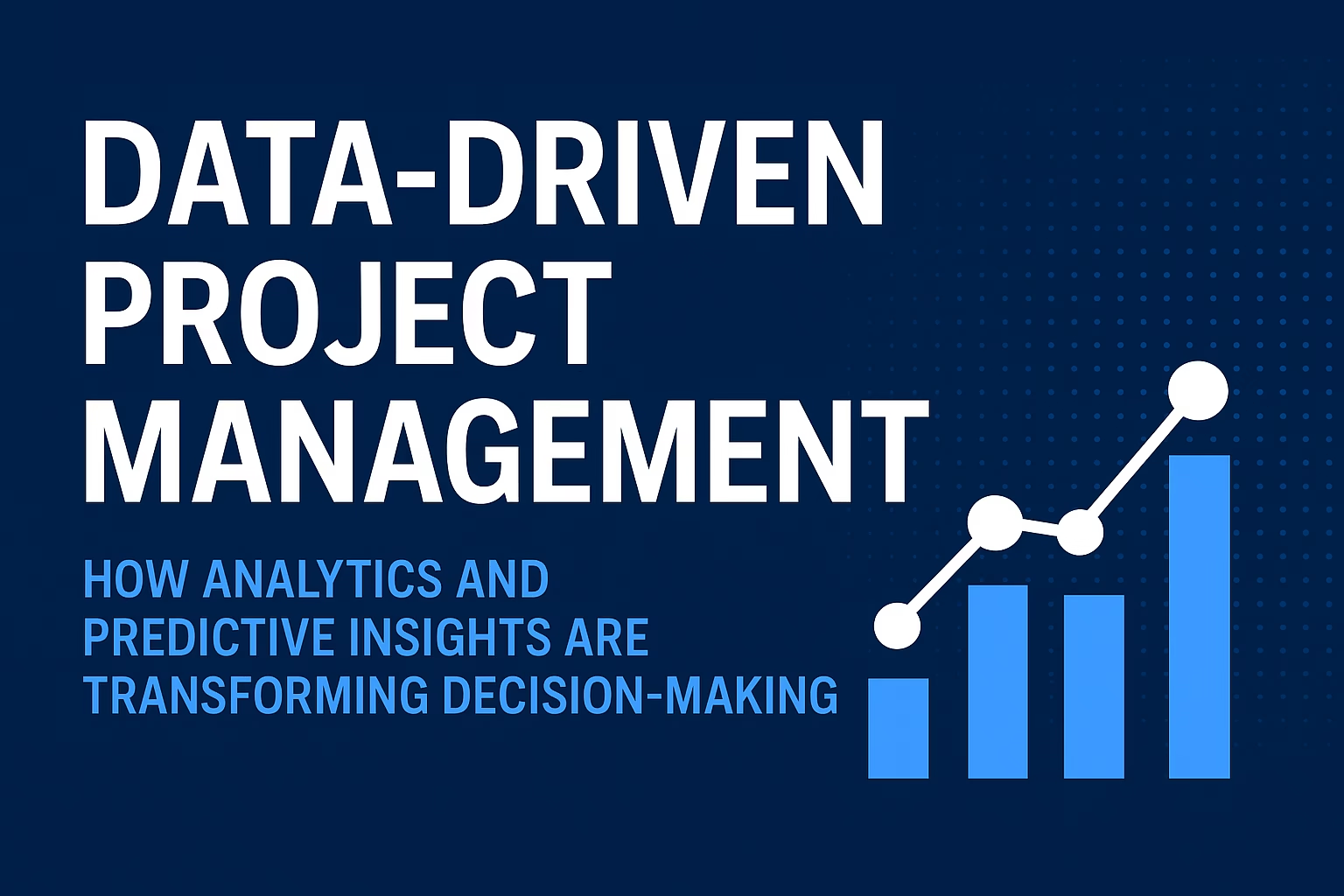In today’s fast-paced business environment, project managers can no longer rely solely on intuition or past experience to guide decisions. Projects are becoming more complex, with tighter deadlines, increasing risks, and higher stakeholder expectations. This is where data-driven project management comes in. By leveraging analytics and predictive insights, organizations can plan more accurately, reduce risks, and ensure projects deliver greater value.
This article explores how data and predictive analytics are reshaping project management, their benefits, challenges, and the skills needed to thrive in this data-first era.

What is Data-Driven Project Management?
Data-driven project management is the practice of using quantitative data, analytics, and predictive modeling to guide every stage of the project lifecycle. Instead of making decisions based only on experience or guesswork, managers rely on evidence-based insights from historical and real-time data.
Predictive insights go a step further: by analyzing patterns and trends, advanced tools can forecast future project outcomes such as delays, cost overruns, or resource shortages—allowing proactive interventions.
Key Applications of Analytics in Project Management
1. Predictive Scheduling
Analytics can highlight where schedules are most at risk. For example, if certain tasks historically take longer than estimated, predictive tools can flag them before they cause delays.
2. Risk Analysis and Forecasting
Data models can evaluate potential risks based on similar past projects, helping managers prepare mitigation strategies.
3. Budget and Cost Control
Predictive analytics can forecast budget overruns by analyzing cost trends, vendor performance, and resource usage patterns.
4. Resource Allocation
By analyzing workload and performance data, project managers can allocate resources more effectively and avoid burnout.
5. Stakeholder Reporting
Data visualization dashboards allow real-time progress tracking, helping managers present transparent, easy-to-digest updates to stakeholders.
6. Performance Benchmarking
Analytics tools compare project performance against industry standards or internal benchmarks, identifying gaps and areas for improvement.
Benefits of Data-Driven Project Management
✔ Smarter Decision-Making – Managers act based on evidence, not assumptions.
✔ Proactive Problem-Solving – Predictive models identify risks before they escalate.
✔ Improved Accuracy – Forecasts for time, cost, and resources are more realistic.
✔ Greater Transparency – Dashboards and analytics foster trust with stakeholders.
✔ Higher Success Rates – Projects are more likely to finish on time and within budget.
Challenges of Implementing Data-Driven Project Management
While powerful, data-driven approaches aren’t without challenges:
-
Data Quality Issues – Poor or incomplete data leads to unreliable insights.
-
Tool Integration – Many organizations struggle to connect analytics with existing PM software.
-
Cost of Implementation – Advanced analytics platforms can be expensive.
-
Skill Gaps – Project managers need training in data literacy and analytics tools.
-
Cultural Resistance – Teams accustomed to intuition-based decisions may resist data-driven methods.
Skills Project Managers Need in a Data-Driven Era
To succeed, modern project managers must develop:
-
Data Literacy – Ability to read, interpret, and question data.
-
Analytical Thinking – Turning data into actionable insights.
-
Tool Proficiency – Familiarity with PM software, dashboards, and predictive analytics tools.
-
Communication Skills – Explaining data insights in clear, non-technical language for stakeholders.
-
Adaptability – Using insights to adjust plans quickly.
The Future of Predictive Analytics in Project Management
The future of project management will be deeply tied to analytics. Emerging trends include:
-
AI-Powered Forecasting – Machine learning models will provide increasingly accurate predictions.
-
Automated Risk Detection – Tools will scan project data in real time to highlight risks instantly.
-
Integrated Dashboards – Centralized, customizable dashboards for all stakeholders.
-
Real-Time Project Health Scoring – Instant insights into whether a project is on track or at risk.
-
Portfolio-Wide Analytics – Companies will use predictive insights across multiple projects for strategic decision-making.
By embracing data-driven practices, organizations will move beyond traditional project management into a future where every decision is backed by evidence.
Conclusion
Data-driven project management is more than a trend—it’s a necessity in a world where projects are becoming increasingly complex. Analytics and predictive insights give project managers the power to anticipate risks, optimize resources, and deliver results with greater confidence.
The shift from intuition to information empowers leaders to focus on strategy and innovation, ensuring not only successful project delivery but also long-term business value.

Good to share such insightfull formats